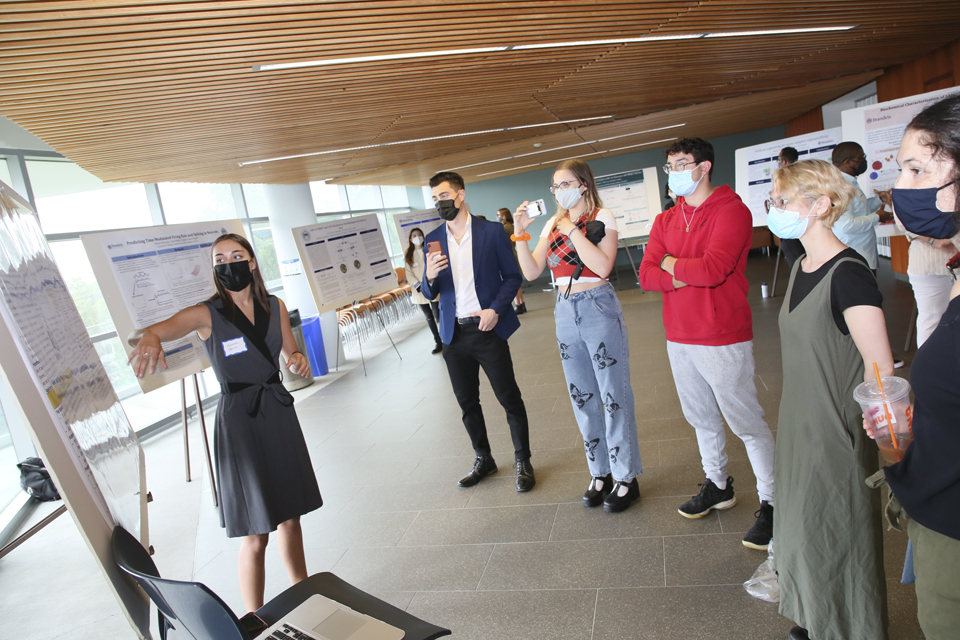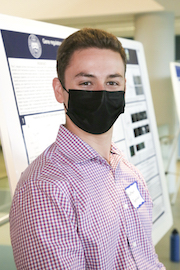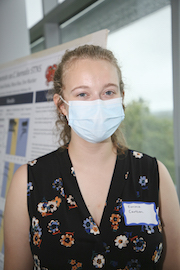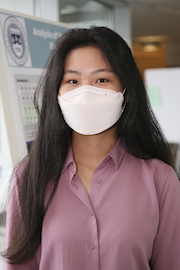SciFest brings undergraduates, researchers together again
121 students presented research across the scientific spectrum
 Photo/Mike Lovett
Photo/Mike LovettA presenter explains research at SciFest 2021.
Months of original research, carefully calibrated experiments and cutting-edge findings took the spotlight at SciFest, Brandeis University’s 10th annual undergraduate scientific showcase and poster session.
With 121 student presenters, including 111 from Brandeis, eight from Hampton University, and one each from New York University and the Whitehead Institute for Biomedical Research, SciFest marked Brandeis’ first major in-person event since March 2020. And while presenters were appropriately spaced and attendees wore masks in accordance with COVID-19 health and safety guidelines, the Shapiro Science Center buzzed with enthusiasm for students’ hard work and passion in their research projects.
SciFest demonstrates an important aspect of the academic environment at Brandeis: close collaboration among students and faculty scholars.
As in previous years, presenters conducted research across the scientific spectrum, from biology, chemistry and physics to mathematics, computer science, psychology and neuroscience. Students worked closely with professors to test new ideas or further research in Brandeis laboratories.
“It’s one of the reasons why I came to Brandeis,” said Matthew Bernstein ’22, a neuroscience major from Lynbrook, New York. “I knew I wanted to do research, and to do it as soon as possible.”

Matthew Bernstein
Bernstein’s presentation at SciFest examined how genes are involved in regulating temperature responses in C. elegans, or nematodes, which are small worms found in several places across nature.
He says the research has implications for understanding sensory responses in humans and other animals when they’re placed in different conditions, and even for our understanding of neurodegenerative diseases.
Bernstein credits his mentors, professor Piali Sengupta and postdoctoral fellow Nathan Harris, for their guidance throughout his research, as well as the positive environment she fosters in her laboratory.
“Piali takes an involved role in all research in the lab, which is a very collaborative environment,” Bernstein said. “She gives you a lot of context about our research and the experiments we’re conducting, and is always eager to help us troubleshoot or offer advice.”
Bernstein's work was funded by the Blavatnik Family Foundation Summer Science Research Fellowships.

Emma Carlson
Emma Carlson ’24 of Naperville, Illinois has had similar experiences working in University Professor Eve Marder’s biology laboratory.
Carlson’s SciFest presentation looked at a group of neurons in the crab stomach and recorded their activity while changing their environment.
“I’m really grateful to be in the lab and working closely with excellent scientists,” Carlson said. “I’ve learned a lot, from dissecting the nervous system to using an electrophysiology rig, and it’s made me interested in pursuing research as a career.”
Iria Wang ’22, a physics, computer science and mathematics triple-major from Boston, analyzed data from the Large Hadron Collider, which is part of the nuclear physics research organization CERN located in Geneva, Switzerland . Wang’s research focused specifically on elementary particles in the Standard Model with professor Gabriella Sciolla.

Iria Wang
“This has been a eye-opening experience for me, especially because it’s been at such a large scale,” Wang said. “I’ve worked with Gabriella for two years and she is a really caring mentor who always has my best interests in mind.”
Wang is interested in high energy particle physics, and is proud to have helped further Sciolla’s work at Brandeis.
“I have enjoyed working with professor Sciolla’s group because I’ve had the chance to contribute to a very impressive project,” Wang said. “I may have been a small part of it, but I am glad to be part of the final body of work through this research.”
Wang's work was funded by the Blavatnik Family Foundation Summer Science Research Fellowships.
Bernstein, Carlson, Wang and their peers all have the opportunity to work closely with renowned faculty scholars and be part of teams that conduct consequential research. The access to mentorship, as well as the open encouragement of undergraduates to take an active role in labs, is a hallmark of SciFest and the sciences at Brandeis.
“You learn to embrace being more inquisitive and you slowly get more involved in the research,” Bernstein added. “You get to watch yourself develop, which validates the experiences you have.”
Categories: Research, Science and Technology, Student Life





